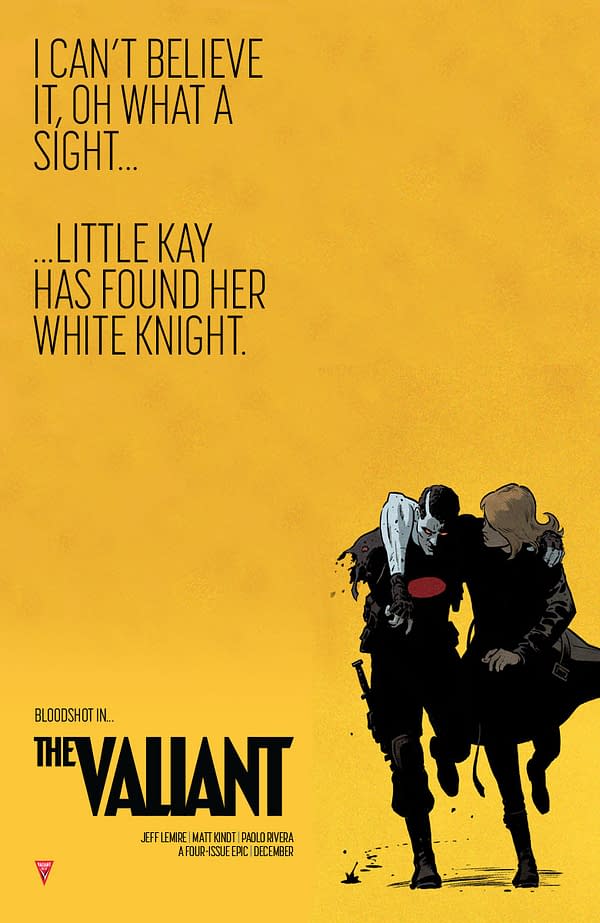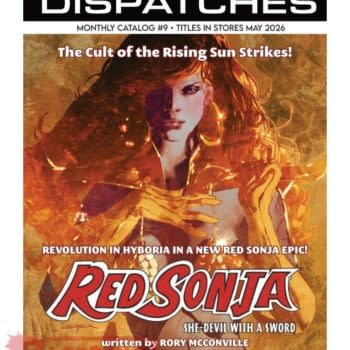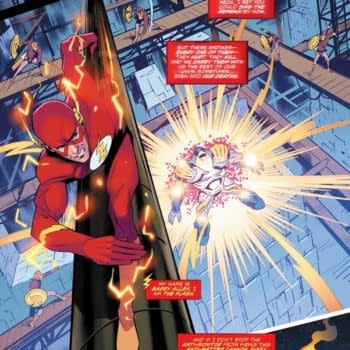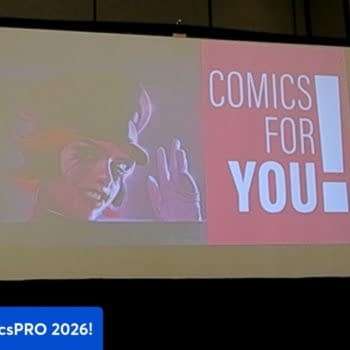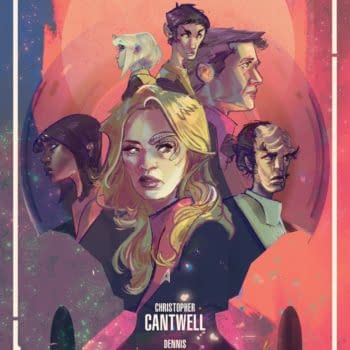Posted in: Comics, Recent Updates | Tagged: Archer & Armstrong, Bloodshot Reborn, Clayton Cowles, Dinesh Shamdasani, divinity, Fred Pierce, fred van lente, Hunter Gorinson, imperium, ivar timewalker, jeff lemire, matt kindt, ninjak, paolo rivera, robert venditti, The Valiant, valiant entertainment, warren simons, x-o manowar
Communist Gods, Time-Travelers, Assassins, And Being In The Now – The Valiant Next Roundtable With Dinesh Shamdasani, Warren Simons, Fred Pierce, And Hunter Gorinson

Leading the way into Valiant Next in 2015, a year in which the company will publish 100 comics, are The Valiant, Ivar: Timewalker, Divinity, Imperium, Ninjak, and Bloodshot Reborn. The line-up paints a pretty clear picture of the company's goals at this time. The Valiant is a crossover designed to be accessible to new readers while bringing in major talent and striking artwork, Ivar brings back the multi-award nominated team on Archer & Armstrong to explore a fan favorite character, Divinity introduces something entirely new to the Valiant Universe with more science fiction focus, Imperium takes Harbinger to the next level, Ninjak is an explosive return to a legacy character in demand for some time, and Bloodshot Reborn delves deeper into the life and times of a flagship character. We can see the mix of old and new in Valiant Next, the threads of continuity and bold choices that declare a distinctive separate phase for the publisher.
Dinesh Shamdasani, Valiant's Chief Creative Officer, Warren Simons, their EIC, Fred Pierce, Valiant's Publisher, and Hunter Gorinson, Director of Marketing, Communications & Digital Media at Valiant, cleared their schedules all over the country (and in fact, beyond) to talk about the past, present, and future of Valiant, and also the logic and promise behind these new books.
HMS: So, it's Valiant Next. Let's start with The Valiant. I just read the first issue…
Dinesh Shamdasani: What did you think?
HMS: I thought it was amazing, honestly. I was very excited about it anyway. I've been hearing about it, especially at New York Comic Con. I'm a huge Matt Kindt fan and Jeff Lemire fan, so naturally I'm excited. The way The Valiant is being presented is, I think, very intelligent. The book itself, even if you read it as if you know nothing of the Valiant Universe, entirely makes sense. Every single aspect would make sense to a new reader. It establishes a lot of information quickly, establishes the relationships between these characters, and also has this huge sweep. I think it's really well done.
DS: Warren has a great story about how The Valiant came together.
Warren Simons: Thank you very much for all the kind words about the book. Everyone here is extraordinarily excited about it. As you know, having Jeff and Matt work with us is really a great thing for us. We think the world of both of them. Obviously, Matt's done a lot of work with us on Unity and Rai, but this'll be Jeff's first foray into working with us, co-writing with Matt. Obviously, we're super-excited to have Paolo Rivera here. He's certainly one of the most talented artists working in the industry. I'm very happy to hear that you dug the book that much.
It started about a year ago. Matt is very good friends with Jeff. They go back a long way. They both broke in through Top Shelf and I think they became good buddies that way. I had a talk with them, and they started to kick around ideas about what the project would be. As they began to discuss and go back and forth, it evolved into The Valiant, which as you know is really a look at the history of the Valiant Universe, starting off as seen through the eyes of the Eternal Warrior and the Geomancer, and their relationship. It covers 10,000 years in history, but hopefully touches on it in a way that is brief and concise, and accessible to new readers. We're very happy with how it's turned out as well.
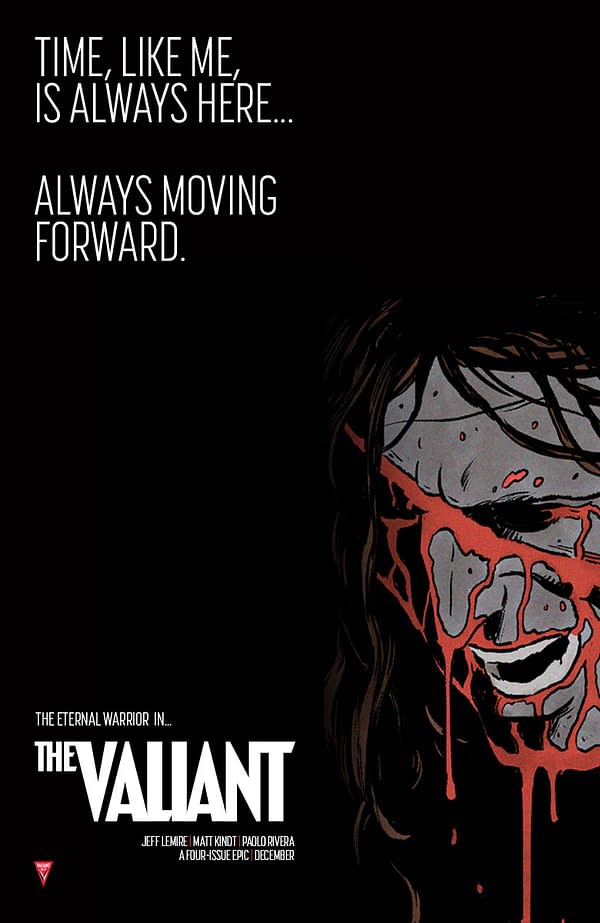
DS: It's three masters working at the top of their craft, and you can see the synergy between Jeff and Matt working with Paolo [Rivera]. And how much the art tells the story, with the guys pulling back on the dialogue because of it. There's a sweeping nature, an epic nature to the opening that we think people are really going to get a kick out of.
WS: There was a time when Matt, Jeff, and Paolo were all in New York and we all had dinner with Paolo. We were talking about how, when editing the book, we would just cut dialogue and cut more dialogue because Paolo's storytelling was just so brilliant that it wasn't the kind of thing where we needed to add a balloon or a caption to help clarify the action. Paolo is just such an extraordinary storyteller that so much of that stuff is innate. It's so inherent to what he does that it certainly made for both a beautiful book and great storytelling.

WS: He definitely does his research.
FP: What's funny about that is that in X-O Manowar, it happened with Robert Venditti and Carey Nord, too. They wanted to be very true to the time period also.
HMS: It sounds like you guys hire a lot of really smart people, really, so attention to detail is going to come out.
WS: We just have a great pool of creators. Whether it's Robert Venditti on X-O, or Joshua Dysart on Imperium, we have a lot of guys who really put their back into it and it makes a difference when it hits the page.
HMS: To what extent was The Valiant planned as a transition point? You had Valiant First, and now we're moving into Valiant Next, with The Valiant standing as a kind of bridge. Was that planned far ahead regarding the different eras you were hoping to move through?
Fred Pierce: We recognize that we have a challenge now. We've been around and we recognize that we are doing books that are as good as anybody's books out there. We're pretty successful, but we're really only still scratching the surface on the number of readers in the industry. We've been publishing now for 2 1/2 years and we hear so often, "I want to start", or "I didn't start yet", and that kind of thing. What The Valiant does, and what the Valiant Next will do, is they give readers the idea that if you want to get involved in the Valiant Universe, here's a very easy way to get involved. It's beautiful art, and great storytelling. And when you have people like Paolo, Jeff Lemire, and Matt Kindt involved, you have all their fans now too.
Maybe this will be the tipping point, and we are trying to create tipping points where people will get involved in the Valiant Universe. The Valiant clearly comes from that, and then we have the Valiant Next program. Every week there will be a new reason to walk into a comic shop. On one level, we've been around 2 1/2 years, on another level, we feel like it's our sophomore year. It's the same reason we go to so many conventions, to say, "Here we are. Take a look at us. We really are worth taking a look at". We really are the next big thing.

DS: It's a very exciting time for us. We've had to be very patient because of the breadth of the characters that we have. Warren likes to talk about how Ninjak, who is part of Valiant Next, was a character that people have been demanding from day one. He was a character we could have launched the universe with, so it's a tremendous benefit that the original creators, who built the house that we are living in now, did all that. But for us, it's also very exciting because we've told the origin stories, we've built the foundations, and now we are able to spread our wings a little bit and expand on the mythology of what it means to be a Valiant character and inhabit the Valiant Universe. I think people are going to be really surprised by books like Divinity, Imperium, and The Valiant where we're doing things no one has seen before. We're doing things not just that Valiant hasn't done in the past, but what comics aren't doing now. It's taking a left turn when everyone else is taking a right.
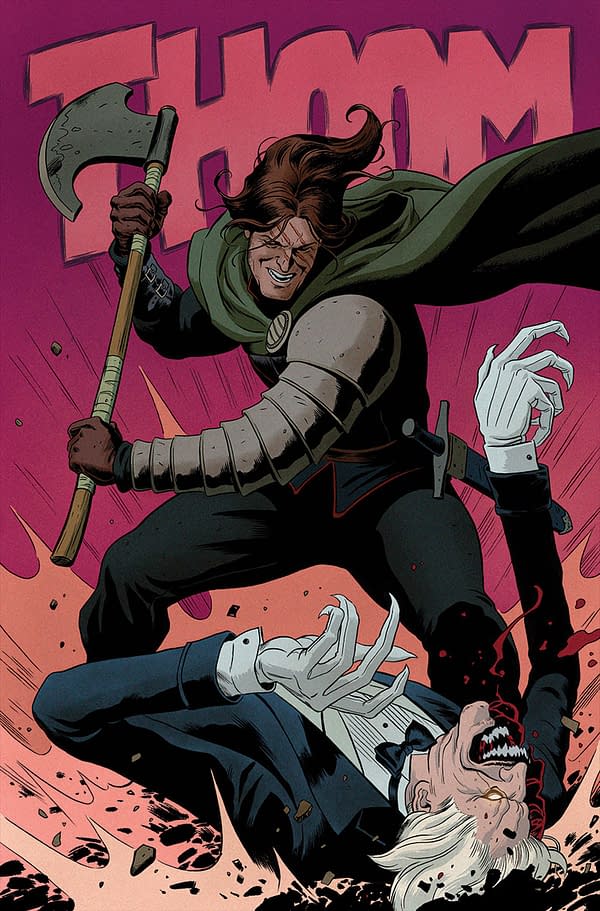
FP: From the very beginning, we have been trying very hard not to be in that "nostalgia" category. We really want to be about the next 20 years and not the last 20 years. Yes, you're 100 percent right. That's what we are really trying to do, to say, "We are about today. We are about tomorrow". The fact that we existed in the past is nice, but it's not essential to what we are.
HMS: What surprises me and catches my attention the most in Valiant Next is moving into time travel and science fiction as well. Because there are not many comic universes that have that as part of their intrinsic features. You can have heroes, and you can have conflicts, and they can exist in the same universe. But it's a little bit different when you start adding the speculative fiction and science fiction elements in a more pronounced way, and that really is distinctive. I think that's going to make a difference in the way people perceive Valiant as well.
DS: We're super excited about that. It's something that has been built into Valiant from the beginning. If you look at the characters, they are different from the Marvel and DC characters in that they are grounded, they are more morally ambiguous, but also they are based in speculative fiction. It's really exciting for us to be able to dive into. Divinity is the one I'm personally most excited about, although I love them all. Just because it's something that's never been done in the Valiant Universe and you can't get elsewhere.
When we were doing the solicit for Divinity, there's a line in there that "God has arrived. And he's a communist". We were wondering, "Is that too far?" But we thought about it and said, "It's great. It's bold. Let's do it". And that's the line that I think has caught fire because there's nothing out there like it. He's a spaceman, and his ideology is different. He's from communism in the 60's, when it was working and was a proud thing to get behind for a certain part of the world. And he's going to bring that here, and he has this tremendous power. The question is how is he going to affect the other characters and how is he going to affect the world? That's really fertile ground to dig into. Matt Kindt is doing amazing things. It's going to knock peoples' socks off.

WS: He's wonderful on it. We're really excited about what Matt's doing. And the pages that have been coming in from Trevor Hairsine are just beautiful artwork.
DS: Matt's doing so much layering, the way he does in Mind MGMT. He's doing things with the panels that is breaking the form, which I've never seen before.
WS: So much of his work like Super Spy is so steeped in the Cold War, post World War II, spy genre stuff, it's wonderful.

DS: We get to tell stories that are big, progressive, and radical, but we also get to tell them with big superhero characters within a shared universe setting, so we really get to eat our cake and have it too. We hear this all the time. If we can get readers to read two books, and nothing else, within 6 months, they are reading 9. They've keyed into the idea that this is a special place in comics right now.
FP: The beauty of who we are is that we don't have to debate and think about corporate policy. We can just say, "That's a great idea. Let's go with it". I can't imagine how many great ideas are killed in comics just because people are afraid to take a chance in corporations that aren't constructed the way we are.
DS: It's also because they have mandates we don't have to follow. They have a certain movie schedule, licensing mandates where certain characters have to be in the spotlight. We just have to worry about what the best story is that we can tell right now. That's it. That's the only thing we have to worry about. It's a very unique position to be in.

FP: Ivar is a Timewalker. He's one of the original three Immortal Brothers. Armstrong is one, Eternal Warrior is one, and Ivar is one as well. He is from the original Valiant Universe.
DS: Yeah, this is like our Better Call Saul to Archer & Armstrong's Breaking Bad. Our Fraser to Cheers?
[Laughter]
DS: Ivar is in Issue #8 of Archer & Armstrong in the original Valiant Universe, and then we got to see him page 1, Issue #1 of Archer & Armstrong, so this is an idea we've been feeding for a long time. It's great to have that initial success with Fred Van Lente and Clayton Henry, and all the guys on Archer & Armstrong, where we got to Issue #25 and got to tell a big story. And now we're in the second part of that which we've been planning all along, which was a whole big run of Timewalker now.
WS: The script's just awesome. It's a lot of fun and very smart. I've been seeing some of the most beautiful covers I've ever had the pleasure to work on.
DS: It's also not time travel in any way you've seen it before. It's crazy to say, since time travel is such a prevalent narrative device. But Fred Van Lente has a different point of view here. He isn't trying to do something different. He's amalgamating everything he's ever seen before, he's consuming it, and then he's breaking it all. So you really get to see almost every single time travel idea related through the narrative of this book, and then he subverts all of it. There's a great line in Issue #1 where Ivar says to Neela, our new character and surrogate POV, "Number one new rule of time travel: Try to kill Hitler". It's so much fun to watch Fred break the form and rebuild it into something stronger.
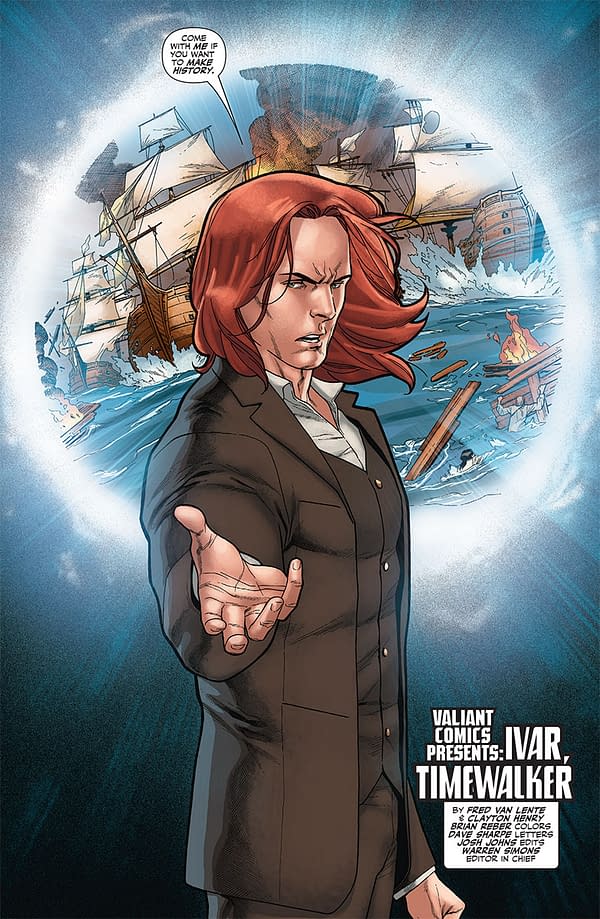
So, was Ivar, like Ninjak, one of these characters you easily could have released in the first wave of Valiant First?
DS: Ivar's probably not one of the characters we would have released in the first wave. He's a fun character and has always been a supporting character, so this is our attempt to slowly bring him up to the forefront. The team has really come up with a cool view of him, a little more Han Solo and devil may care. The difference between he and his brothers is that Armstrong is a hedonist. His attitude about living forever is "Get drunk. Find girls. Have a party". The Eternal Warrior's attitude is the polar opposite, which is, "Do your work. Put your head down. Make the world a better place. Your responsibility is duty". It's very interesting to see that third point of the triangle with Ivar come together. He is a little bit more shoot from the hip, and that's really fun. That's why there's so much humor and adventure in this Ivar book. It'll be very much like Archer & Armstrong in its tone, but very different in that it's a big adventure.
WS: I think one of the great things about working with Fred on Ivar was that during the pitch stage, he said, "There's a knock on the door. A scientist walks over and opens it. And a guy is there and says, 'You have to come with me. A bunch of people are here to kill you. You just invented time travel'. And she says, 'What are you saying?' And then he stops, looks down at his watch, and says, 'Oh, hold on a second. I'll be right back'".
[Laughter]
There's a lot of fun, irreverent, awesome stuff in Ivar. It's very much Fred Van Lente's take on it. Clayton has obviously done some extraordinary work for us. He did Harbinger Wars, the first arc of Archer & Armstrong. He did the last arc of Harbinger for us. I'm really excited to have him on board here.

WS: In Harbinger, the main character is called Toyo Harada, and he is the child of the bomb. He was in Japan during WWII, and when one of the bombs dropped, it activated his powers. He was a child at the time, and it killed his whole family and destroyed the city. He's gone through life with the mandate that this must never happen again, that humanity must never descend into that level of chaos. As a telekinetic, and one of the most powerful people on the planet, he's spent his entire life in the service of making sure that it doesn't happen. But he's not really your typical mustache-twirling villain. He's not the kind of guy who is going to take over the White House or Congress. He's smarter than that. He understands that that might work for a week, but it won't work for a lifetime. He's been a kingmaker operating behind the scenes, and has built one of the most powerful corporations in the world. He's overthrown dictators. He's been working in the system from the thin veneer of legitimacy.
At the end of the last Harbinger arc, Joshua Dysart came up with a brilliant story. And the idea here is that Harada's corporation's rival, PRS [Project Rising Spirit], gets hacked, and for 30 years they've been keeping tabs on Harada. So now, Harada's been more or less "outed" as a supervillain. As the man who rigged elections, influenced currencies, and everyone is going for his head. So, as a result of that, he can no longer operate within the system. Now he's more or less forced to gather 4 or 5 of the most powerful pieces within the Valiant Universe and now is looking at force as a realistic option. He tried not to be that guy, but now they've left him no choice. That's basically the high concept of Imperium and where Harada's story picks up.
DS: But we should say, it's four pieces we haven't seen before. Throughout his life, he's been searching for components that can help him attain his goals. And he's found some but kept them out of the way because they are too dangerous to have out in the world. But he's got one last hand now, and he's going to play a risky hand.

WS: His goal is to bring peace to the world by any means necessary. With the emphasis on "by any means necessary".
DS: The tag-line is "The battle for Utopia begins now". Which is a contradiction within the statement, making it very charged.
WS: The fact that he has to build a "legion of supervillains" to defend his turf after he spent a lifetime not having to do that is an absolutely fascinating starting point. Joshua Dysart has just done amazing things on Harbinger and this is a great place to pick up his story.
HMS: It sounds like Harada has become, finally, what others and the reader feared he might, at some point, become.
DS: Can we talk about the new characters at all, Hunter?
Hunter Gorinson: Oh, absolutely. To me, that's one of the most interesting aspects of the book, and also the setting.
WS: We have a bunch of different characters coming onboard. There are going to be 4 key characters. One of them is Lord Vine. He's essentially a Vine character, and Harada can't read the minds of the Vine. But he developed the Cold War with the Vine.
DS: The Vine are part of the shared universe. Manowar discovered their secret weapon and captured it, and it made him X-O Manowar.
HG: And one of the distinguishing features of this book versus Harbinger is that all of those characters were psiots. They all had mind-based powers. But now you're going to see Harada looking for a new squad who aren't necessarily psiots. Lord Vine is an alien. And there are some other characters who aren't necessarily telekenetic.
WS: Yes. We have Lord Vine, who is an alien. We have a robot. Major Mech, as he's called by people who work with Harada. He has a bit of an antagonistic relationship with Harada. He's an Artificial Intelligence. Then we have a scientist character called Broken Angel, though I don't want to give too much away about her. Then there's a character called Grave Dog, who is essentially a Chechnyan soldier. He channels the violence he's grown up with in a different direction. And they come together in the Foundation Zone. The Foundation Zone is Somalia.
Harada has taken over one of the most inhospitable zones on the planet and is setting up hospitals there to take care of people. His goal, again, is not to rule for his own profit, but for the good of mankind. But that's always a tricky juxtaposition to walk.
DS: I've just realized we're doing a book about Utopia that takes place in Somalia with a Chechen soldier, a robot AI, an alien, a scientist, and an evil Asian guy with powers. This is the most batshit crazy book! And it all makes sense to us.

WS: Yeah, I think our writer Joshua Dysart is very astute politically, and is very aware of the politics on that continent, so gravitates toward that.
FP: And it's a perspective we don't have in the West, and he brings that to the table as well.
DS: As Dysart has said in interviews, as well, Africa is the future. It has so many resources, land, and manpower. Harada would be someone who realizes this, and would go to a place that's undervalued. It's very interesting stuff.
HMS: There's a heck of a lot of multiculturalism in the Valiant Universe compared to some others. I think the Big Two play at that, but it's not obvious to what extent they are committed to it. When I consider the sweep of these stories, you have things happening all over the world in different time periods and different cultures.
DS: It's a testament to the founding fathers of Valiant. They were a very multi-cultural group and were able to create the universe in the 90s so that it more accurately reflected the environment at the time. And also, we're a very multi-cultural environment in house. I don't think we necessarily do it consciously, but we just reflect the way we see society. In the office, we've got all walks of life, all races and creed, religions, and cultures in the office. The creators, too, are well traveled and well-read, so you see stories here that you might not see elsewhere.
FP: Also, comics have always reflected their time. You can look at the origins of DC and Marvel, and how they reflect their times, and the origin of our universe is today. And today is multi-cultural. If you look at a Valiant comic, it really echoes with what's going on in the world today. But the creators are very open to it, and if you aren't open to it, it doesn't happen.

DS: It's nice also that some of those things are the flavor du jour so they can do almost "color of the month" events or they can break new ground. There's marketing buzz and a bump for them. But over time it will eventually result in those characters being major characters. There are books right now that are female-driven and minority-driven right now and they are big books.
HMS: I agree. And I read many of them. I just think that their process has taken so much to get to that point whereas you all have always made it part of your world, so you can introduce things more organically. Obviously, Bleeding Cool talks a lot about controversies in the industry, and there are always criticisms against the Big Two for not being diverse enough.
It just seems like they've had to really struggle to get to the point where they are now. And also some of those books are being cancelled and aren't lasting. She-Hulk isn't going beyond its initial 12 issue plan. Hopefully, there will be longevity for some of these characters, but the process to get to this point has been, at times, quite a spectacle.
DS: For us, it's a win-win. If they become more diverse and succeed, so are we and we'll succeed. If they don't, hey, we'll take the talent. We've got Steve Lieber on Quantum and Woody. If they take off, we ride the wave, but if they don't, we'll take the talent.
FP: I think also, when you look at other companies, there is so much continuity, and it's so hard to turn the continuity in a particular direction. I think they do a great job, and I think that everyone in the industry is conscious of where the world is today and that we need to reflect that. I think that some of the time the larger companies are blamed for things failing, when they are really failing, even though they are good books, because people aren't buying them. They can only put it out there. The fans vote. They buy it or don't buy it.

FP: And also, if you take a company like Image, they can give things a shot even though they might not necessarily work. Then many of the books have a unique perspective, and then we wait and see which books strike a sympathetic chord. If you put some great talent in, and often Image does, you see if it works, and since they are small arcs, if the book doesn't work, it goes away. But it's much harder to do those things when you have the spotlight on you.
HMS: And every publisher is going to have to find a way to have experimentation and trial and error to move forward. I agree. They just have to find a way that works within their system to do it. It's brave to try, and even braver to get back up after a failure.
FP: And you see them doing it all the time. I think they get a bad rap. They do this all the time, and the readers aren't responding quickly enough to make it work.
DS: Fred feels the pain of the publisher.
FP: And how many times do you call me and say, "Do you want to take that chance?" And I can take the chance, because I don't have the same pressures on me.

WS: Ninjak will be written by Matt Kindt, with art by Clay Mann. As we mentioned earlier, he's probably been the most requested character at conventions. Robert Venditti said on a podcast that when he incorporated Ninjak into X-O, he found him ridiculous, but by the end of that arc, Ninjak had become one of the coolest characters he'd ever written. Matt has a very unique take on the book, and it's going to take place in two different time-periods essentially. When Issue #12 comes around, the stories come together. We didn't want to rush the story out there, but wait until the creative team were ready.
DS: It's a big revenge story, really, and it's very subversive of the genre as well, like almost anything we do. The first page is this crazy, over-the-top sequence with a ninja, a blind warrior, on a bridge, being attacked. And then you turn the page and you see young Colin King in a theater watching this movie with all these ninjas. That's what we assume a ninja story is going to be like, and then Matt deconstructs the whole thing and builds something cooler. There are 7 villains Ninjak fights over the course of the story. There's a whole second time-line we can't say much about, but thematically it runs at the same time as the story, and you have pieces of it throughout the 12 issues. The two will resonate together until you get to the 12th issue and your mind is just blown.
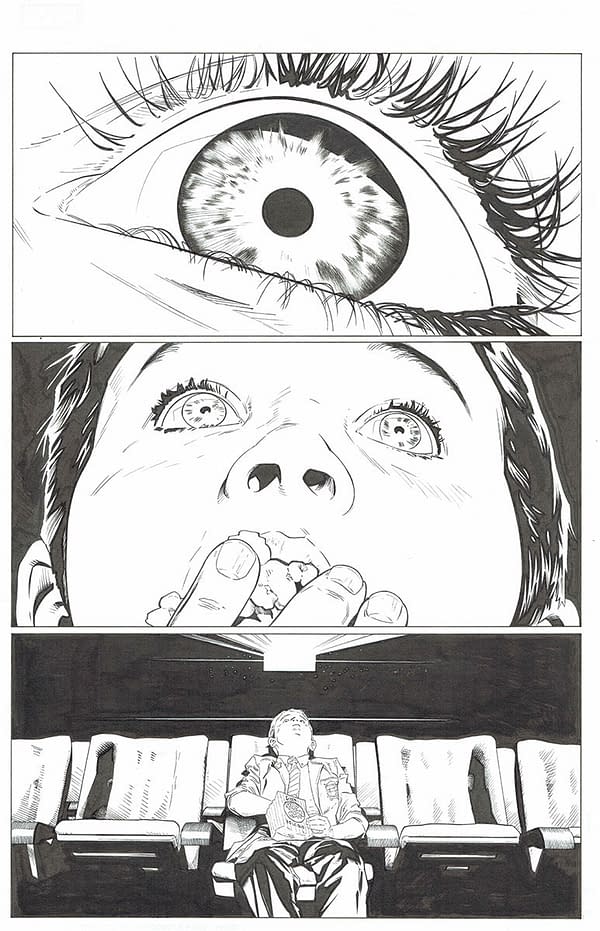
FP: When you have something that is a limited series, you really need to highlight it in a different way. You can make a commitment to this and have a good deal, and this makes this happen.
DS: We've had limited series before, but these are a little bit special. When you take a look at the sweeping, epic nature of The Valiant, it deserved the royal treatment. When you see Divinity, and see the scenes, scope, and scale, as well as the fact that it's our first big push behind a new character, we wanted to go the extra mile. So, when you pick it up, you can feel the ambition in it.
HMS: In terms of Prestige format, that's card cover, and is it a larger size or page count?
FP: It won't be a hard cover, but it'll be a stiff cover book. It'll be very limited advertising inside.
HG: There'll be surprises included in them that we'll be talking about very soon.
DS: There's going to be a little thing that comes after the cover that's very sweet, though we can't talk about it yet.

WS: He's gone fishing. No, I'm kidding.
DS: We should to that as a zero issue. "I caught a fish this big".
WS: The events of Bloodshot Reborn takes place right after the events of The Valiant. We try to be very precise about how the books influence each other. I don't want to say that Bloodshot is depressed, but it's a crazy chance the company is taking on, and I'm very excited about it. He's not in a great place.

Is there anything particular that you all are going to be doing that's new in terms of marketing and publishing for Valiant Next in comparison to Valiant First?
DS: For us, it's the same thing that we always do. We concentrate on making the best books that we can. We don't publish a ton of content, or stretch ourselves too thin. We just focus on the 100 or so books that we are going to publish in the next 12 months. We want to make sure that no matter how many books someone is reading, the Valiant books are going to be the best ones they read. We don't worry about movies, or TV, or licensing or trying to steal talent or make waves. It's just about better stories.
FP: In terms of different things, we did make up about 100 standees for The Valiant for retail shops. Every month, Hunter puts together 16 or 24 page previews of books that are coming up and we sent tens of thousands of them to the stores. These aren't big marketing ploys, and we're not advertising on TV, but in our industry, these things are innovative. We innovate the industry even though we are a small company. Sometimes we come up with an idea and two weeks later, you'll see it in stores. That's how quickly we work.
In addition, we are increasing the size of our sales staff, and our marketing staff. We are hiring so that we can speak to stores directly. We'll be calling hundreds of stores from now on to get feedback from retailers, to ask, "What's working for you? What's not working for you?" Not only about Valiant, but what's working for them in general. We've doubled our sales force already, which is easy in a small company, but we're also looking to add onto the marketing force. A big part of what we do is also social media, so you'll see us very active there. That's how you reach out to fans today. There are tens of millions of people who say they are fans of comic books, and maybe a million who walk into stores, and we want to get more of a percentage of that.
DS: We are also honest about who we are as a company. We ask where we can fight this guerrilla warfare, and Fred's right, social media is where we will find fans. And also in retail stores, which are still a battleground, and we can make a lot of noise there. With our covers, the standees, and we can use all of these as a push.
FP: Our biggest allies are our fans. And after that, the sales people in the stores who help sell us. And Diamond, who has been a great promoter for us, and has been behind us from the first day. You'll see a lot of advertising on our website. You'll see a lot of advertising on different websites. We advertise and promote however we can. People see the more splashy things we do, but also the grassroots stuff is very important.

They were very big fans in the 90s and were very on top of the return. They obviously are in touch with you all, getting this material and making it visible in the shop. So, I've seen it in action and working. This is Conquest Comics in Bayville, NJ.
FP: That's really our strength. We do very well digitally, but the backbone of how we've been successful is our fans who have been behind us, retail stores, and Diamond. The press has also been great. I think initially, the press was cautious, but today it's not even an issue. It's about what we're doing next. We have gotten past, as you said, the "nostalgia" buy. We're very much a reflection of what's going on in the world.
HMS: I think one reaction you'll get from people as Valiant Next launches is, "My God, has it been only 2 1/2 years?" You've done so much in that time.
FP: As Hunter was saying, we have 100 issues next year. Is it a lot or is it a little? Well, it's a lot for Valiant, even if Marvel comes close to that in two months. For us, it's a huge task.
DS: The other reason I think it feels like it's been longer is because we take our time and make sure it's very strong work, so everything we've done has actually come out and been a commercial success. We haven't had a miss yet, which is a little shocking, even for us. You'd expect by this point to have something not work despite best efforts. Because everything has succeeded, it's resonated, and because it's resonated, we have a larger voice than you'd think for a company our size with only 2 1/2 years behind us. I think that's why we feel larger and noisier.
FP: We've also had a spotlight on us more than you'd expect for a company this size.
WS: I think we've moved office 2 or 3 times because we keep growing and growing, but we haven't really extended our lines past 9 books, which is, I think a testament to the ethos of the company that slow and steady wins the race. Take care of the panel, that takes care of the page. Take care of the page, that takes care of the issue. Take care of the issue, that takes care of the arc. It's one brick at a time. Don't worry about extending a crossover beyond what the story should be. While we've seen such an explosion and our fans are very happy with this, it's about telling one story at a time.
HMS: It's impressive. I know how hard you work. I see you at conventions, I see your books in the shop, I see the previews on the counter, and you all have really busted ass to get where you are this quickly.
DS: Thanks for your support.


